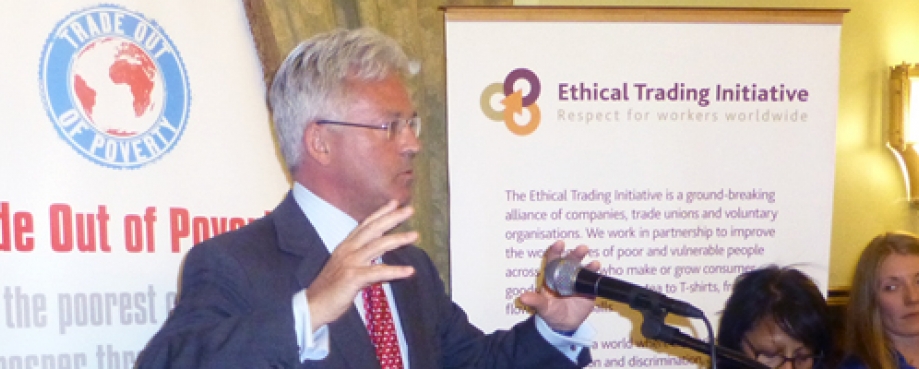
Minister of State for International Development, Alan Duncan, yesterday urged companies and other stakeholders to engage with ETI to improve supply chains in the Bangladesh garment sector.
His endorsement came during an address to parliamentarians, businesses and civil society at the Free, Fair and Ethical Trade discussion at the House of Commons.
The event saw ETI and the Fairtrade Foundation team up with All-party campaign Trade out of Poverty to give Parliamentarians greater insight into what’s really needed to make supply chains more responsible.
Amid acknowledgment of the key role big business has in global development, the audience heard cross-party support for greater collaboration between business, government, trade unions and advocacy groups in pursuit of more responsibly sourced goods.
Mr Duncan called for business and civil society to work together to ensure a ‘pincer movement’ from outside Bangladesh and within, to raise standards and enable the words Made in Bangladesh to become a symbol of quality. Describing last week’s DFID meeting of brands and retailers convened by Secretary of State for International Development Justine Greening, and attended by ETI as ‘very productive’, he talked of ETI being a ‘central partner’ enabling the Government to work closer with businesses to improve working conditions in supply chains.
Shadow Secretary of State for International Development, Ivan Lewis talked of the opportunity to turn the sourcing debate from margin to mainstream in the wake of the Rana Plaza tragedy. He challenged the government to develop a more coherent strategy to help maximise the impact of aid and development spending made through the private sector.
ETI member companies were represented by Chris Gilbert-Wood of Finlay’s Horticulture. Speaking on the progress that forward-thinking ETI member-companies have made on improving conditions for employees, he commented, ‘There is still much to be done and ETI strives to achieve more. However, there are limits to what companies alone can do to solve the more intractable problems. Where issues are endemic to a country or region, we welcome the UK Government and others’ practical intervention and dialogue to help clear the path for companies to do more for their workers.’
Chris cautioned against the proliferation of ‘marketing-driven’ standards and the duplication of audit and verification activity and called instead for a greater focus on improving conditions on the ground. He also echoed calls for the Government to publish its eagerly anticipated strategy for implementing the UN Guiding Principles on Business and Human Rights.
